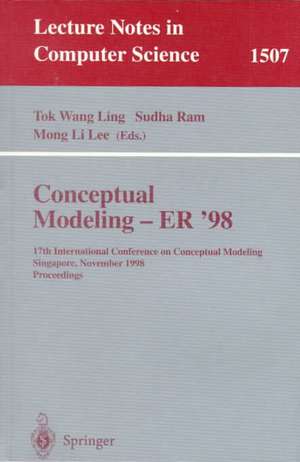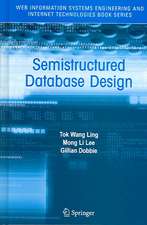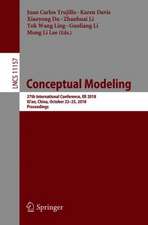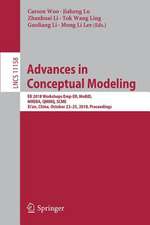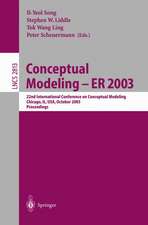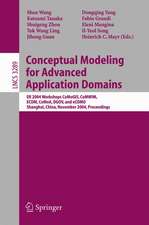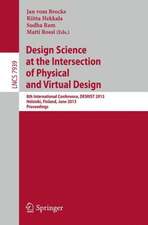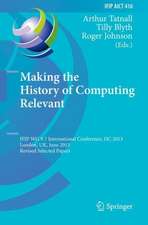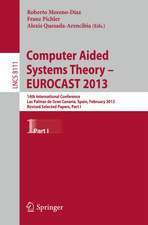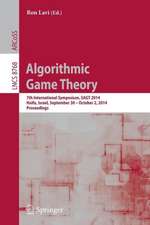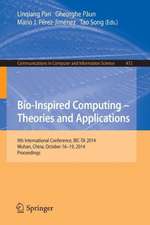Conceptual Modeling - ER '98: 17th International Conference on Conceptual Modeling, Singapore, November 16-19, 1998, Proceedings: Lecture Notes in Computer Science, cartea 1507
Editat de Tok Wang Ling, Sudha Ramen Limba Engleză Paperback – 21 oct 1998
Din seria Lecture Notes in Computer Science
- 20%
 Preț: 1061.55 lei
Preț: 1061.55 lei - 20%
 Preț: 307.71 lei
Preț: 307.71 lei - 20%
 Preț: 438.69 lei
Preț: 438.69 lei - 20%
 Preț: 645.28 lei
Preț: 645.28 lei -
 Preț: 410.88 lei
Preț: 410.88 lei - 15%
 Preț: 580.46 lei
Preț: 580.46 lei - 17%
 Preț: 427.22 lei
Preț: 427.22 lei - 20%
 Preț: 596.46 lei
Preț: 596.46 lei -
 Preț: 449.57 lei
Preț: 449.57 lei - 20%
 Preț: 353.50 lei
Preț: 353.50 lei - 20%
 Preț: 1414.79 lei
Preț: 1414.79 lei - 20%
 Preț: 309.90 lei
Preț: 309.90 lei - 20%
 Preț: 583.40 lei
Preț: 583.40 lei - 20%
 Preț: 1075.26 lei
Preț: 1075.26 lei - 20%
 Preț: 310.26 lei
Preț: 310.26 lei - 20%
 Preț: 655.02 lei
Preț: 655.02 lei - 20%
 Preț: 580.93 lei
Preț: 580.93 lei - 20%
 Preț: 340.32 lei
Preț: 340.32 lei - 18%
 Preț: 938.83 lei
Preț: 938.83 lei - 20%
 Preț: 591.51 lei
Preț: 591.51 lei - 15%
 Preț: 438.59 lei
Preț: 438.59 lei - 20%
 Preț: 337.00 lei
Preț: 337.00 lei -
 Preț: 389.48 lei
Preț: 389.48 lei - 20%
 Preț: 607.39 lei
Preț: 607.39 lei - 20%
 Preț: 1024.44 lei
Preț: 1024.44 lei - 20%
 Preț: 579.30 lei
Preț: 579.30 lei - 20%
 Preț: 763.23 lei
Preț: 763.23 lei - 20%
 Preț: 453.32 lei
Preț: 453.32 lei - 20%
 Preț: 575.48 lei
Preț: 575.48 lei - 20%
 Preț: 585.88 lei
Preț: 585.88 lei - 20%
 Preț: 825.93 lei
Preț: 825.93 lei - 20%
 Preț: 763.23 lei
Preț: 763.23 lei - 17%
 Preț: 360.19 lei
Preț: 360.19 lei - 20%
 Preț: 1183.14 lei
Preț: 1183.14 lei - 20%
 Preț: 340.32 lei
Preț: 340.32 lei - 20%
 Preț: 504.57 lei
Preț: 504.57 lei - 20%
 Preț: 369.12 lei
Preț: 369.12 lei - 20%
 Preț: 583.40 lei
Preț: 583.40 lei - 20%
 Preț: 343.62 lei
Preț: 343.62 lei - 20%
 Preț: 350.21 lei
Preț: 350.21 lei - 20%
 Preț: 764.89 lei
Preț: 764.89 lei - 20%
 Preț: 583.40 lei
Preț: 583.40 lei - 20%
 Preț: 649.49 lei
Preț: 649.49 lei - 20%
 Preț: 341.95 lei
Preț: 341.95 lei - 20%
 Preț: 238.01 lei
Preț: 238.01 lei - 20%
 Preț: 538.29 lei
Preț: 538.29 lei
Preț: 342.65 lei
Preț vechi: 428.31 lei
-20% Nou
Puncte Express: 514
Preț estimativ în valută:
65.56€ • 68.64$ • 54.25£
65.56€ • 68.64$ • 54.25£
Carte tipărită la comandă
Livrare economică 07-21 aprilie
Preluare comenzi: 021 569.72.76
Specificații
ISBN-13: 9783540651895
ISBN-10: 3540651896
Pagini: 504
Ilustrații: XVI, 482 p.
Dimensiuni: 155 x 235 x 26 mm
Greutate: 0.7 kg
Ediția:1998
Editura: Springer Berlin, Heidelberg
Colecția Springer
Seria Lecture Notes in Computer Science
Locul publicării:Berlin, Heidelberg, Germany
ISBN-10: 3540651896
Pagini: 504
Ilustrații: XVI, 482 p.
Dimensiuni: 155 x 235 x 26 mm
Greutate: 0.7 kg
Ediția:1998
Editura: Springer Berlin, Heidelberg
Colecția Springer
Seria Lecture Notes in Computer Science
Locul publicării:Berlin, Heidelberg, Germany
Public țintă
ResearchCuprins
Keynote 1:.- The Rise, Fall and Return of Software Industry in Japan.- Session 1: Conceptual Modeling and Design.- Conceptual Design and Development of Information Services.- An EER-Based Conceptual Model and Query Language for Time-Series Data.- Chrono: A Conceptual Design Framework for Temporal Entities.- Session 2: User Interface Modeling.- Designing Well-Structured Websites: Lessons to Be Learned from Database Schema Methodology.- Formalizing the Informational Content of Database User Interfaces.- Session 3: Information Retrieval on the Web.- A Conceptual-Modeling Approach to Extracting Data from the Web.- Information Coupling in Web Databases.- Structure-Based Queries over the World Wide Web.- Session 4: Semantics and Constraints.- Integrated Approach for Modelling of Semantic and Pragmatic Dependencies of Information Systems.- Inference of Aggregate Relationships through Database Reverse Engineering.- On the Consistency of Int-cardinality Constraints.- Panel 1:.- Realizing Next Generation Internet Applications: Are There Genuine Research Problems, or Is It Advanced Product Development?.- Keynote 2:.- Web Sites Need Models and Schemes.- Session 5: Conceptual Modeling Tools.- ARTEMIS: A Process Modeling and Analysis Tool Environment.- From Object Oriented Conceptual Modeling to Automated Programming in Java.- An Evaluation of Two Approaches to Exploiting Real-World Knowledge by Intelligent Database Design Tools.- Session 6: Quality and Reliability Metrics.- Metrics for Evaluating the Quality of Entity Relationship Models.- A Transformational Approach to Correct Schema Refinements.- The Guidelines of Modeling – An Approach to Enhance the Quality in Information Models.- Industrial Session 1: Industrial Experiences in Conceptual Modeling.- Improving the Quality ofEntity Relationship Models—Experience in Research and Practice.- The Troll Approach to Conceptual Modelling: Syntax, Semantics, and Tools.- Process Failure in a Rapidly Changing High-Tech Organisation: A System Dynamics View.- Session 7: Object-Oriented Database Management Systems.- ROL2: A Real Deductive Object-Oriented Database Language.- Multiobjects to Ease Schema Evolution in an OODBMS.- Implementation of Automatic Lock Determination in C++-Based OODBMSs.- Panel 2:.- Do We Need Information Modeling for the Information Highway?.- Session 8: Data Warehousing.- Design and Analysis of Quality Information for Data Warehouses.- Data Warehouse Schema and Instance Design.- Reducing Algorithms for Materialized View Updates.- Industrial Session 2: Industrial Case Studies.- Reengineering Conventional Data and Process Models with Business Object Models: A Case Study Based on SAP R/3 and UML.- An Active Conceptual Model for Fixed Income Securities Analysis for Multiple Financial Institutions.- An Entomological Collections Database Model for INPA.- Session 9: Object-Oriented Approaches.- A Global Object Model for Accommodating Instance Heterogeneities.- On Formalizing the UML Object Constraint Language OCL.- Derived Horizontal Class Partitioning in OODBs: Design Strategies, Analytical Model, and Evaluation.
Caracteristici
Includes supplementary material: sn.pub/extras
